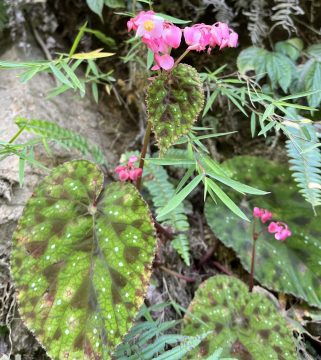New Plant Species Discovered by USTM Scientist


9th Mile, Khanapara, Ri Bhoi, October 24, 2024: A new species of flowering plant, Begonia neisti B.Hajong, N.Bhat & P.Bharali, has been discovered in the remote Dibang Valley of Arunachal Pradesh, India. This significant botanical discovery was made by Dr. Nazir Ahmad Bhat, Assistant Professor at the University of Science and Technology Meghalaya (USTM), in collaboration with Mr. Bipankar Hajong, Ph.D. Scholar at CSIR-North East Institute of Science and Technology (CSIR-NEIST), and Dr. Pankaj Bharali, Senior Scientist at CSIR-NEIST, Jorhat.
In this context, Dr. Nazir Ahmad Bhat said, “Begonia neisti is a unique species with variegated leaves featuring white-silver circular spots and dark brownish-red patches near vein junctions. Its distinctive morphological features, including large leaves and a striking white stripe on the stems and petioles, set it apart from other known species in the Begonia genus”. The species was found thriving in moist hilly slopes along the roads between Hunli and Anini, with flowering observed from November to January.
The discovery was confirmed using advanced molecular phylogenetic analysis, particularly through the ITS2 marker. This genetic analysis revealed close evolutionary relationships with other Begonia species, particularly those in the section Platycentrum from the Indian subcontinent. The research, published in the Nordic Journal of Botany (John Wiley & Sons Ltd), provides comprehensive details of the species’ morphology, genetics, and ecological significance.
Despite its recent discovery, Begonia neisti has been classified as Data Deficient (DD) according to the IUCN Red List criteria. The ongoing road expansion in its habitat poses a potential threat, prompting calls for monitoring and conservation efforts. This discovery further highlights the rich biodiversity of Arunachal Pradesh and the continued importance of botanical exploration in the region.